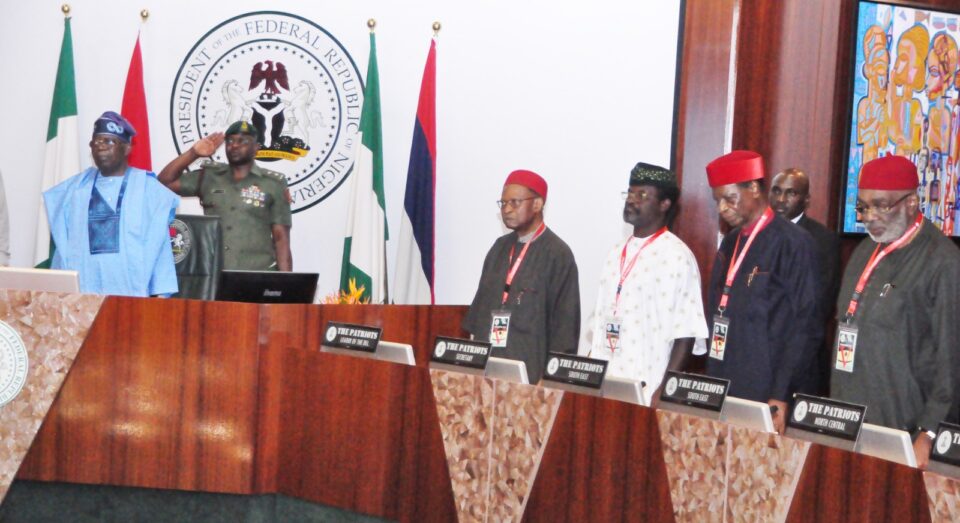By Terhemen Mbachirin
A mere amendment to the existing Nigerian Constitution 1999 seems unsatisfactory to several citizens and continues to throw up strong sentiments of the lack of legitimacy of the present legal document that was imposed upon the country’s over 200 million population by the military.
Critics of the constitution consistently argue that there is an urgent need for a comprehensive and participatory approach to the drafting of a fresh guiding legal document for the country that reflects and addresses the diverse aspirations of the citizens, the fundamental issues of true federalism as well as the nation’s governance structure.
Only last week Friday 9th August 2024, President Bola Tinubu received a fresh request from The Patriots, a prominent group of nonpartisan eminent Nigerians at the Presidential Villa, Abuja led by a former Commonwealth Secretary-General, Chief Emeka Anyaoku, where they made a strong appeal for the convening of a national constituent assembly with the mandate to draft a new constitution for the country.
In the opinion of The Patriots, President Tinubu must act swiftly to send an executive bill to the National Assembly, proposing the convening of a national constituent assembly with at least three individuals directly elected on a non-party basis from the 36 States of the federation and the Federal Capital Territory (FCT).
Chief Anyaoku and his group are not alone in such recent demands from the government. Chief Femi Falana for instance, is among several public commentators and human rights advocates in the forefront insisting that the 1999 constitution remains a decree (Number 24) signed into law by the last military dictatorship of General Abdulsalami Abubakar for the country.
“The Nigerian constitution is not a legitimate document, but a legal document which we had all thought was going to midwife civil rule that will ultimately lead to genuine democracy in our country,” Falana said in March 2022.
It is becoming obvious that there is a sense in the growing consensus of agitation for a new constitution. The Federal Government may need to begin to consider some of the reasons being put forward such as the question of legitimacy, the present constitution’s inability to unify the nation, as well as its inadequacy in addressing key national issues.
In the views of The Patriots group, for any pluralistic society such as Nigeria to thrive, the country must take the issue of diversity and sincerely address it, as failures to do so, have the consequences of possible disintegration. The cases of Yugoslavia, Czechoslovakia, and Sudan readily come to mind. The argument is that, if Nigeria is indeed a pluralistic society, it then must be seen as drafting a “people’s democratic pluralistic constitution” to effectively manage its diversity and challenges.
There have been past efforts in this direction. President Goodluck Jonathan convened the 2014 National Constitutional Conference hoping strongly that an open discussion could foster unity and resolve conflicts arising from ethnic, political, and economic disparities while aiming to create a platform for various stakeholders to propose constitutional reforms and recommendations that could enhance governance and national cohesion.
Although it is widely believed that the 2014 national conference’s output of over 600 resolutions and a 10,335-page report had a significant impact on the country’s political landscape
with its key recommendations for restructuring Nigeria’s political system, ranging from abolishing the existing 774 local authorities to creating 18 new States, and modifying the revenue allocation formula, it was also largely criticised.
Despite the criticisms, the conference chairman, Justice Idris Kutigi, expressed the optimism that at least for one thing, the 2014 conference succeeded in bringing Nigerians together. “We have held a National Conference and we are more united today than ever,” Kutigi noted.
President Jonathan himself failed to pursue the vision of the delegates of the conference as recommended in their report, maybe, due to his failure to return for a second term after his defeat in the 2015 presidential election.
With the latest call by The Patriots, the question on the lips of many Nigerians is whether or not President Tinubu would truly yield to the current demand and begin another round of a constitutional reform exercise as all attempts in the past by the National Assembly in this regard have only been about amending some sections of the 1999 constitution. Both the Senate and House of Representatives recently voted on 68 bills seeking to amend the Constitution, but there are doubts whether these piecemeal changes can ever have any far-reaching impact.
In advising President Tinubu on the need to consider a bill for a new constitution, Chief Anyaoku, and his group explained that deliberations at the next possible constituent assembly should take into full account the 1960/63 constitutions, as well as the recommendations of the 2014 National Conference and indeed of the various national conferences that considered the Nigerian constitutions.
This is why it becomes imperative to reflect on President Tinubu’s response to The Patriots. Does the President’s reaction give hope for the clamour or would it remain another empty political promise? These are his words; “I have listened to you carefully, and this is not a group that I can ignore. This is a group of patriots reflecting the heart and aspirations of society. I thank all of you for being here.
‘’I have faced the challenge of this democracy that I inherited from your struggles. I must recognize the fact that these challenges are most required for good governance. We have no other choice, and I believe also that it is most difficult to manage the twists and turns of democratic governance.
‘’I want to assure all of you that as I listened to your two major requests on the path to referendum and that should lead to constitutional measures that will fit our diversity and governance so that we avoid conflicts and break-ups. I believe in the unity of this country and I want to assure you that whatever is necessary to put happiness and good governance in the hands of all Nigerians is what I would do.”
What is however, certain from President Tinubu about the fresh clamour for constitutional reforms is that he is not in a hurry, given the amount of pressure his government faces as a result of humongous economic challenges including hunger and high cost of living which must be tackled immediately to save lives. However, the President acknowledged that the fresh push for constitutional reforms is a longstanding issue in Nigeria’s national discourse.
‘’The avoidance of chaos is necessary to build this country and move its aspirations forward for the benefit of all of us. I am currently preoccupied with economic reform. That is my first priority. Once this is in place, as soon as possible, I will look at other options, including constitutional review as recommended by you and other options,’’ President Tinubu said at the recent meeting with The Patriots.
The general feeling is that no matter how long it takes to await the presidential action, millions of Nigerians remain eager to witness the bold initiative of a historic political and constitutional change capable of resetting Africa’s economic giant-Nigeria towards a much expected brighter future.
(Terhemen Mbachirin, a public political commentator writes from Makurdi, Benue State)



